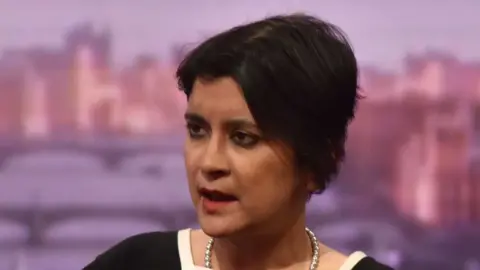Sarah Everard: Labour peer to demand fuller Met inquiry
 Reuters
ReutersA Labour peer is to demand a fuller inquiry into the Metropolitan Police and the circumstances surrounding the murder of Sarah Everard.
Home Secretary Priti Patel announced a non-statutory inquiry on Tuesday into "systematic failures" that allowed her killer to remain a police officer.
Policing Minister Kit Malthouse said a non-statutory inquiry would be faster.
But Shami Chakrabati said non-statutory inquiries lacked both independence and powers to make witnesses appear.
The former shadow attorney general has now tabled an amendment to the government's policing bill - due back in the Lords in two weeks - demanding a statutory inquiry, led by a judge, to begin within a month of the law passing.
And she has put another proposal forward to ensure police officers are not allowed to ask a woman to get into a car unless they are accompanied by another officer.
A Home Office spokeswoman said it stood by the department's earlier commitment, that to "provide assurance as swiftly as possible" the inquiry will be on a non-statutory footing, which can be converted to a statutory inquiry if required.
She added: "The chair and terms of reference for the inquiry will be confirmed in due course."
The killing of Ms Everard sent shockwaves throughout the UK and raised questions about the safety of women on the streets.
When details of her murder emerged last week - that serving police officer Wayne Couzens used his warrant card to fake an arrest to kidnap her, before raping and killing her - the police faced growing calls for answers over its policies and procedures.
The Met confirmed it would carry out an independent review into its standards and culture, and the Independent Office for Police Conduct (IOPC) is also carrying out a review.
But Ms Patel said a Home Office inquiry would "give the independent oversight needed to ensure something like this can never happen again".
'Inquiry must not short-change women'
The department said the inquiry would initially be non-statutory but could be converted to a statutory one if required, with Mr Malthouse telling BBC Radio 4's PM the first option was much quicker to put in place.
But Baroness Chakrabati pointed to the review into the murder of Daniel Morgan, where a non-statutory panel set up by then-Home Secretary Theresa May took eight years to report back.
When its report was finally released, the panel said its work was "made more difficult" by not having the power to "compel witnesses to testify, nor could we compel the Metropolitan Police to disclose documents in a timely manner".
In her amendment, the Labour peer wants an inquiry under the Inquiries Act 2005 - making it statutory - to start within one month of the policing bill being approved to "identify the lessons to be learned for the professional culture, funding, vetting and organisation of policing, the prevention of violence against women and the investigation and prosecution of misogynistic crimes".
The amendment also says the chair should be a senior woman judge or retired judge, alongside a panel of other members with relevant experience.

Baroness Chakrabati told the BBC: "Neither the Met commissioner's internal review [into the circumstances surrounding Ms Everard's death] nor the home secretary's non-statutory inquiry will have either the robust independence or powers to compel cooperation that are so urgently required.
"The Daniel Morgan review panel described the obstruction they faced in June.
"Anything short of a full-blown judge-led 2005 Act inquiry will short-change women who have been let down by the police and criminal justice system for at least a decade."
The Home Office said: "The Police, Crime, Sentencing and Courts B Bill is currently going through Parliament and we will consider amendments as they are raised."
